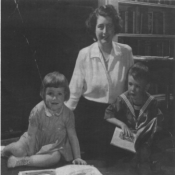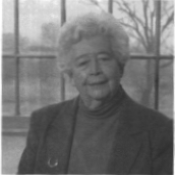




I sigh and look at my watch. I've been interviewing Mrs. Barbara Drew for over an hour now, and Mrs. Drew has just finished her last sentence. Touched, I comment, thank her, and switch off the tape recorder. Sinking into a chair, I drift into thought, digesting what this woman has just shared with me about her experiences during World War II. In addition to being a wife and homemaker, Mrs. Drew did volunteer work for the Civilian Defense.
We started out as a group of women in East Providence, I guess maybe thirty of us. We studied topography. We studied mechanics. We learned how to change tires on big trucks. We met at the Rhode Island Armory and drove trucks. These were army trucks. Old ones. Several nights my friend Lorraine Geissler and I, along with eight or nine other women, drove at night without any lights on the trucks. We were being taught how to evacuate children, the sick, and the elderly from the coastal areas in which we lived into the mountains of Vermont and New Hampshire, where the people would be safer in the event of an emergency.
I was fortunate in that my husband was able to help at night to take care of the baby. Then I had a second child and my in-laws helped out a great deal. They wanted me to do what I was doing.
My husband Ed -- an orchestra leader -- he led the big bands that played at the Biltmore hotel and almost every week at the Quonset Officers Club, the Newport Officers Club, and various other parties for the men that were in the service. The men were primarily from Newport and they were officers in the U.S. Navy. The Junior League of Providence and other groups of women volunteered their time and they came to these and danced with these Naval officers.
I asked Mrs. Drew about the sacrifices she had to make at home during the War.
Well, one had to plan very carefully. We were very limited. We could only buy a small amount of sugar. It was very difficult to get butter. That's when margarine started to become popular. It was dreadful. It was white, these lumps like lard, and you were given a little round ball that looked like a cherry. You had to put it in this white lard and let it melt and then you mixed it all up so that it became a rather ugly yellow color. And meat was very hard to get. Very hard to get. You had to have friends in the right places. At that time, during the middle of World War II, markets opened up and sold horse meat. In Olneyville there was a market there that sold nothing but equine meat. I guess everybody tried it and it was pretty hard to take. It was so bloody and disagreeable to look at. I just couldn't eat it or give it to my family.
Finding the idea of eating horse meat pretty hard to take myself, I moved on to another topic -- what was happening in her south shore beach community.
At Green Hill, the government built towers across the street from our house. They also built what was supposed to resemble, and did very closely resemble, a normal Rhode Island farmhouse. Actually, it was occupied by the soldiers. And towers were built on the beach. There was communication between the towers. And every night, a truck came from Camp Burlingame loaded with vicious attack dogs. The men that were trained to take care of the dogs patrolled the beach from Moonstone to Charlestown, and back again, all night. No civilian was allowed on the beach after curfew, which was before sunset.
The soldiers were looking for ships. They were looking for submarines. They were looking for any signs of life that might be the enemy in the waters between Block Island and the mainland. They on occasion discovered certain things. They found an officer's cap on the beach, right there at Green Hill. There was a place in Charlestown, which at that time was a little community building, where all these things were brought. The men from the United States government decided where they came from and why they were there and so on and so forth. It just wasn't our beach that was selected, it was being done universally, I'm sure.
The coastline was a very dangerous spot. Every night was a blackout night. Every night we had to pull down these black shades -- very unattractive shades, so the lights from our house could not be seen from the outside. There was a man named Mr. Holberton who was the warden. He came by every night to make sure everybody was in total, total darkness. And if you insisted on displaying lights, you could be arrested.
I considered what she had said. The U.S. government seemed dead serious about keeping America safe. I guess pulling down your shades every night was a small price to pay for the safety of you and your children. Curious about other ways in which the war effort affected her, I asked about how the ration coupon worked.
Well, this area was excellent. I never had any problems. I had a ration for my gasoline. I had an "A" coupon and that's all I deserved. My husband had a "B." Doctors, ambulance drivers, and private ambulance drivers had, as I recall, a "C" coupon.
Near the end of the interview, I asked her how she personally felt about World War II.
I think a lot was covered up. We never really knew what happened. I knew the outline of it, but I never knew exactly what happened at Pearl Harbor until the end of the war. I don't really feel that the war changed my life to any drastic extent, except that it lead me to a, well, little more feeling of independence.
wondered if she thought the war era was a better time in comparison to the Great Depression. Her response was immediate.
No. I found the war being worse in every way -- no comparison. More distasteful. More devastating. The Depression was money. These were lives. The war was lives.
Copyright 1995